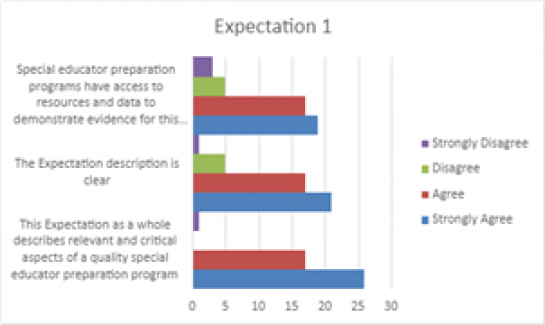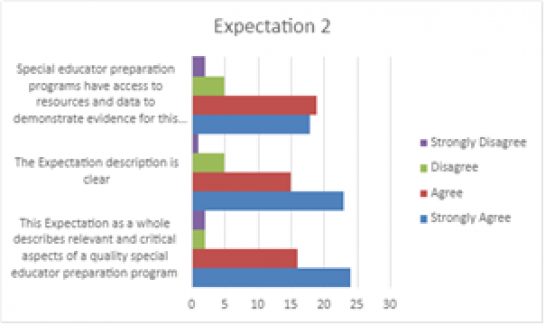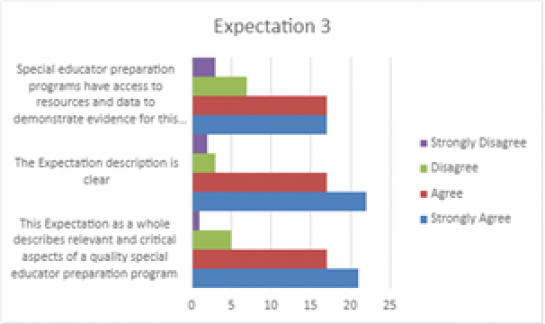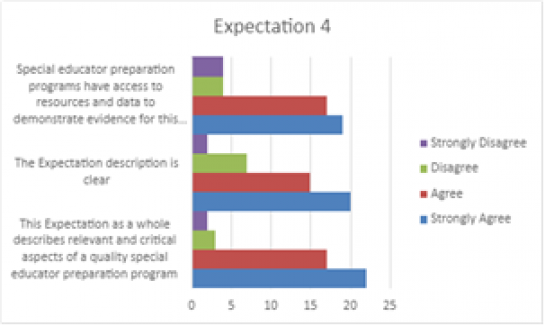CEC Accreditation Expectations
The Accreditation Commission of the Council for Exceptional Children (CEC) conducted a public survey in late spring and early summer 2021 to collect feedback regarding a set of Draft Accreditation Expectations that will serve as the program requirements framework for CEC Accreditation. The survey was distributed through CEC membership channels and through CEC’s website.
The survey was centered around four draft Accreditation Expectations and whether the respondents thought that each Expectation was relevant, clear, and if a special educator preparation program would have access to data and resources to demonstrate evidence of meeting the expectation. A total of 44 individuals responded over a four-week period representing higher education faculty, in-service P-12 educators, doctoral candidates, and P-12 administrators.
The Accreditation Commission plans to address the majority of the comments through its policies and procedures such as concerns related to FERPA and data sharing, equity, and evidence of field and clinical experiences. Of note, after a careful review of the comments and feedback, the Accreditation Commission did not find sufficient reason to significantly alter the draft Accreditation Expectations.
The charts below summarize the survey responses received for each of the four Accreditation Expectations:
- Expectation 1: Developing Candidate Proficiencies stated in relevant set of CEC Standards
- Expectation 2: Measuring Candidate Performance on CEC Standards* and Using Data for Continuous Improvement
- Expectation 3: Assuring Public Accountability
- Expectation 4: Contextual Indicators of Quality Required for the Self-Study Report
Overwhelmingly, respondents agreed, or strongly agreed, that each of the draft Accreditation Expectations represent a critical aspect of a quality special educator preparation program. In addition to the questions related to each of the draft Accreditation Expectations the survey asked respondents to “describe any critical concepts of a quality special educator program that are not addressed within the draft Expectations” and the responses overwhelmingly affirmed the scope of the Expectations.
The Accreditation Commission is committed to establishing and operating a reputable accreditation process through collecting feedback and peer engagement. CEC staff will carefully review additional comments received and begin to compile a list of FAQs that will be published on the CEC Website.
The intent of the Accreditation Expectations is to establish broad categories; the next phase in developing the process will detail specific evidence that will be expected of programs. The Commission will continue to review feedback and comments as it further develops and operationalizes CEC’s Accreditation process.
If you’re interested in receiving updates related to CEC Accreditation, please sign up here.
Accreditation Expectations:
Expectation 1: Developing Candidate Proficiencies stated in relevant set of CEC Standards*
The program has a clear plan of study that includes coursework, field and clinical experiences, and other practice-based learning opportunities that are sequenced and scaffolded to facilitate and develop candidates’ proficiencies stated in the relevant set of CEC standards*.
- Required coursework and other practice-based learning opportunities in the program of study comprehensively includes preparation for all aspects of the relevant set of CEC Standards*
- Program field and clinical experiences are aligned to/with expectations stated in the relevant set of CEC standards.
Expectation 1 focuses on the program’s design and ability to develop candidate proficiencies through a foundation of coursework, program of study, and field and clinical experiences.
Sample evidence for this expectation could be a course catalog, syllabi, and other documents that outline requirements for program completion.
* 2012 Advanced Special Education Preparation Standards; 2020 Initial K-12 Practice-Based Professional Preparation Standards for Special Educators; 2020 Initial Practice-Based Professional Preparation Standards for Early Interventionists/Early Childhood Special Educators (EI/ECSE)
Expectation 2: Measuring Candidate Performance on CEC Standards* and Using Data for Continuous Improvement
The program demonstrates that program completers are proficient in the relevant set of CEC standards.
- The program utilizes six to eight key assessments for all candidates that, collectively, are aligned to and fully address the relevant CEC standards*.
- Each key assessment’s instructions and rubrics are aligned to components within the relevant set of CEC standards*.
- The rubrics for each key assessment include objective descriptions of candidate performance expectations for meeting the relevant CEC standards*.
- Each key assessment displays consistency between the tasks in the instructions, what is evaluated in the rubric, and the tasks evaluated at each level of performance across the rubric.
- The program routinely and reliably collects, analyzes, and stores candidate performance data from the key assessments.
- The program provides data from multiple cycles for each key assessment, disaggregated by key component, that measures candidate performance on the relevant CEC standards*.
- Candidate performance on key assessments demonstrates that at least 80% of candidates have met each standard on each candidate’s best attempt at the assessments.
- The program conducts a process at least once each year for reviewing and analyzing candidate performance data, with faculty to improve teaching and learning in relation to the relevant set of CEC standards*.
- The program’s analysis of candidate performance data includes disaggregation by candidate characteristics that informs the program’s plan for differentiated academic and nonacademic support for the success of all candidates.
Expectation 2 is focused on how a program meets the CEC Standards that are relevant to their program. Programs will minimally submit six to eight key assessments as evidence of meeting the CEC standards. A key assessment is defined as an assessment that all candidates will be required to take for program completion.
Sample evidence for meeting Expectation 2 will be in alignment with resources currently posted for meeting CEC standards through CEC’s National Recognition Process.
Expectation 3: Assuring Public Accountability
The program is transparent with the public about its effectiveness in preparing special educators, publishing on its website in a place easily accessible to current and prospective candidates and the public:
- Program objectives and evidence of meeting these objectives; and
- Effectiveness data including the number of program completers by academic year, rate of completion within program’s published timeframe, and other institutionally designed measures that speak to program effectiveness.
Expectation 3 requires programs to publicly post performance data and to provide evidence that the program demonstrates ongoing attention to innovation and improvement.
Sample evidence for Expectation 3 could include demonstration of effective performance in relation to candidate learning (e.g., completion, graduation, retention, success with academic transfer, success with entry into graduate school).
Expectation 4: Contextual Indicators of Quality Required for the Self-Study Report
The following indicators of program quality illuminate the evidence the program submits in Expectations 1, 2, and 3. The information provided in this section is not factored into the accreditation decision; it is gathered to support the program’s self-study and continuous improvement.
Mission and Conceptual Framework
- The program demonstrates that its mission statement and conceptual framework reflect and support the institution’s and the community’s context as well as the program’s role in preparing special education professionals.
- The program provides evidence that its mission statement and conceptual framework includes stakeholder perspectives, are regularly evaluated, and reflect a commitment to diversity, equity, inclusion, and to preparing special education professionals who can meet the needs of every child.
Leadership and Faculty
- The program chair or lead administrator has authority and responsibility for the development and administration of the program and has sufficient time and resources to fulfill the role responsibilities.
- Faculty qualifications and composition supports the ability of the program to effectively prepare candidates in the relevant CEC standards*.
Resources and Student Support
- Candidates have equitable access to academic and non-academic supports and resources designed around the needs and characteristics of the candidate population.
- The program routinely reviews the performance of candidates and advises candidates regarding their progress and potential in the program.
Expectation 4 provides the opportunity for programs seeking accreditation to provide contextual information to inform the accreditation evaluation process. Submission opportunities for this Expectation encompasses three categories: Mission and Conceptual Framework, Leadership and Faculty, and Resources and Student Support.



